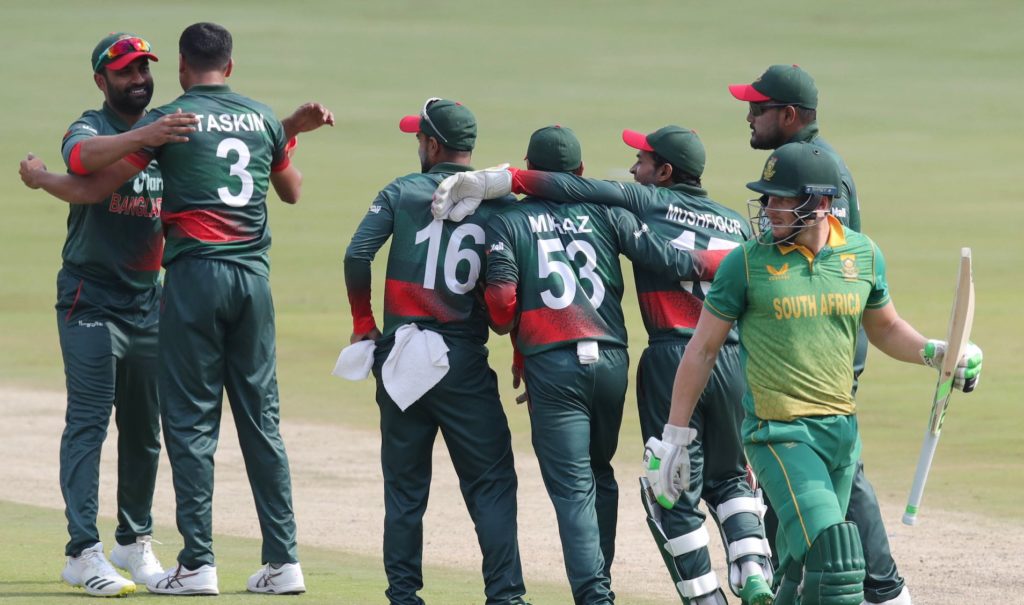There is no structure in place for consistent Proteas success. They appear to be reliant on feeling and talent. That’s not what defines champion teams, writes RYAN VREDE.
I’ve spent a day trying to crystalise my thoughts on the Proteas, specifically their ODI series defeat to Bangladesh.
I’ve tried to establish what enables a team to bank Test and ODI series victories over India, and draw a Test series against the current Test world champions, New Zealand, but then lose a home ODI series to Bangladesh, and do so delivering the most impotent performance.
I’ve concluded that, at this stage of their development, the Proteas are to cricket what Tottenham Hotspur is to football, what France is to rugby and what the Dallas Cowboys is to American football.
They are an “on their day” team. “On their day” teams rely on feeling and talent to carry their performance. When they’re feeling it, their talent soars and they are capable of beating teams who are widely considered to be better than them.
When they aren’t feeling it, they are pushovers, as the Proteas were in Centurion on Wednesday. As they were in the first Test of their series against India and New Zealand. As they were in the embarrassing ODI defeat to Ireland in July 2021. And as they were in the decisive World Cup pool-stage opener against Australia last year.
Feeling and talent are just two components of building a consistently successful team. When they exist independent of a structure built on a clearly defined culture, intensive analysis, work ethic, tactical awareness, mental and physical preparation and a strong identity (among myriad qualities), inconsistency will mark their performances.
Under head coach Mark Boucher, they have never won more than four matches consecutively (they’ve gone on a five-match winning streak once, but two of those matches were warm-ups for last year’s T20 World Cup). All four matches were against minnows Ireland.
This matters because the ability to go on extended winning runs defines elite teams. The Proteas are not that. At least, not yet.
They are a good team, one the elite teams respect because they know they are dangerous, “on their day”.
These types of cricket teams rarely achieve anything significant. They never win big tournaments. To do so they’d have to string three victories together in the knock-out phase, and potentially four or five in the lead-up to that phase. These kinds of teams aren’t in the conversation in the World Test Championship either. That demands winning consistently home and away.
Only highly competent and visionary leadership transforms “on their day” teams to champion ones. I have my reservations around whether Boucher, the team’s senior leadership, and his coaching team possess the qualities needed to take this team to the next phase of their development.
Boucher is into his third year in charge. I have looked and listened for the types of cues that have defined the best coaches, things that make you believe that defeats are acceptable in the context of the broader vision.
To cite an example close to home, Rassie Erasmus suffered heavy defeats in the infancy of his tenure as Springbok head coach. Yet I always got the impression, through his press conferences, that he had complete control, and there was a vision and a comprehensive and detailed roadmap to their goals.
This has not been my experience of Boucher.
In the wake of Wednesday’s defeat, Boucher, as he has done after almost every defeat, offered nothing that suggested he has a clear understanding of what makes his team tick.
He said his team “lacked intent”, but couldn’t explain why that was. It was not the first time he has spoken of this lack of intent. He has also regularly lamented lethargy but struggled to explain it. Each time he seemed as baffled as those of us who watched the resultant defeat unfold.
He added: “I think [the ODI side needs] belief in the way we want to play”. This speaks to the team’s tactical identity, something Boucher is mostly in control of and has had three years to ingrain. Yet he offered no clear path forward in this regard.
WATCH: We went to sleep – Boucher
Perhaps Boucher is figuring this out himself. However, international sport is a brutal and unforgiving place to learn fundamental coaching lessons. His coaching team can’t be spared criticism but ultimately he must own the team’s failings.
Players carry some responsibility, but the onus is on leadership to find ways of extracting the best out of gifted Test, ODI and T20I squads.
Where does this leave us?
The Proteas’ inconsistency can be viewed in two ways: They’re either an elite team in the making and just need patience to be extended while they grow to the ceiling of their potential. Or they are nothing more than what we’ve seen to date – an “on their day” side who could hurt you, but equally could surrender meekly.
Proteas fans must hope they emerge as the former, and quickly. Their inconsistency in ODI cricket means they are ninth on the World Cup Super League log. This means, to qualify directly for the 2023 World Cup, they are likely to have to beat India, England, and Australia in upcoming series.
To do so would require a level of consistency that has eluded them to date.







